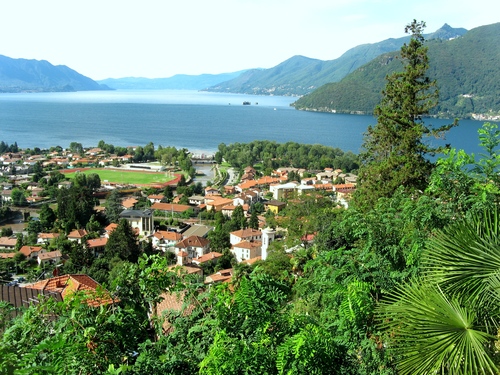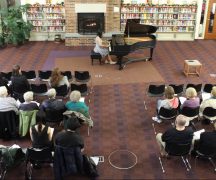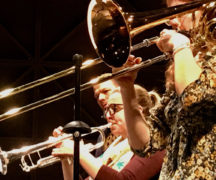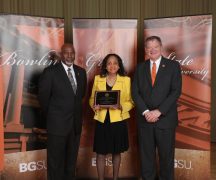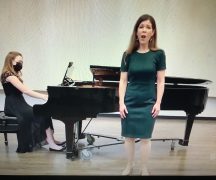By DAVID DUPONT
BG Independent News
This tale of global cultural connections begins with a car ride.
Thomas Rosenkranz was talking with his friend and fellow pianist Nathanael May, the founder of the SoundSCAPE festival in Maccagno, Italy.
They like the town in the Lombardy region in northwest Italy bordering Switzerland. They trusted the people they worked with and the musical and housing facilities were good.
SoundSCAPE, now 10 years old, had developed a reputation as a top festival for contemporary music, and they wondered if they could extend their stay by tagging on another, separate piano festival.
So the Maccagno Piano Days Festival was born last summer.
Rosenkranz, a piano professor at Bowling Green State University, said their discussions turned to who would to study at the festival. “Where are most of the pianists coming from nowadays who want to do these kind of things, come to Europe to study, and can afford it? They mostly come from China. That’s what we realized.”
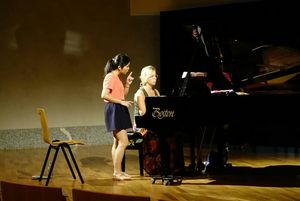
Photo from http://www.pianodaysfestival.org/
Rosenkranz, who has spent the past year in China, has establsihed ties to that country. When he was on the faculty at the University of Hawaii in Manoa, he frequently traveled to Taiwan to teach and perform. When he came to BGSU seven years ago he was part of a delegation of faculty sent to China by Dean Richard Kennell of the College of Musical Arts to perform and recruit.
“When we were there I fell in love with it,” Rosenkranz said. He’s been returning ever since. This year he focused on establishing links to the major conservatories throughout the country, an effort made possible by his ability “to speak a little Mandarin.”
Those connections help bring Chinese musicians to the Maccagno festival. “We geared it to this huge population of pianists in China,” he said. “We also have a competition because the Chinese like that sort of thing. It’s a good excuse to get better. Even if they don’t win it doesn’t matter. This process of trying to better yourself is very important.”
This year, 40 pianists ranging in age from 12 to 35 will attend to study with seven faculty from the U.S., Italy and China. The youngest participants must come with their parents. The chance, he said, to study and visit Italy “is part of how we market it.”
“Who doesn’t want to go to Italy?”
The featured guest artist is Italian pianist Emanuele Arciuli, a concert artist and professor of piano at the Bari Conservatory.
Enrollment is double what it was in the inaugural year. Of the 40 attending this year, 35 are from China with the rest from the U.S., Japan and Germany, he said.
The low student-teacher ratio is intentional. “We don’t want faculty to be working all the time,” Rosenkranz said. “We want them to enjoy Italy.”
Each faculty member teaches a few hours in morning, presents one master class during week and performs one concert.
“We want all the students to play for everyone.”
As a faculty member both at SoundSCAPE and the piano festival, Rosenkranz said, “it’s jarring and fascinating to deal with contemporary music and then the next week everyone’s playing standard repertoire.”
Still, he said, “music is music. Jazz or classical you just get at it a different way.”
The Chinese passion for classical music is in some ways hard for Americans to fathom, he said.
During the Cultural Revolution under Mao Zedong in the 1960s into the 1970s, all Western culture was banned. As those strictures lifted, the Chinese came to view Western music “as something elite, something profound, something other than themselves”.”
“Now that they have money they want to learn the piano. They want to learn classical music,” he said. They don’t want to learn Chinese traditional music.
The rise of international classical piano super star Lang Lang has also spurred interest. “All these parents see that if you’re a pianist you can grow into someone like Lang Lang and be highly, highly successful. They know everyone can’t be as successful, but he’s huge role model for the Chinese.”
At classical concerts, he said, the audience is full of young people and parents with children. “That means when they grow up, they will have a huge interest in this music,” Rosenkranz said.
While in the United States, we have “American Idol,” the Chinese had a televised competition featuring classical pianists and violinists. “When you have things like that it creates such a huge interest in the Chinese mind in what they think is popular and what they think is interesting.”
All that makes possible a musical link from a college town in Ohio to a lake town in northern Italy to the most populous country in the world. “It all comes back to China,” Rosenkranz said. “We saw a niche in China and have this opportunity in Italy, and we tried to put the pieces together, connected these dots.”

